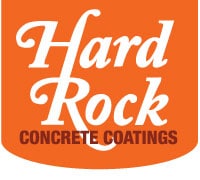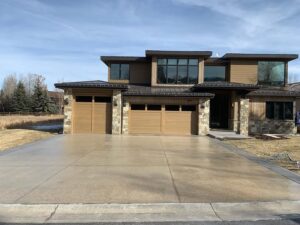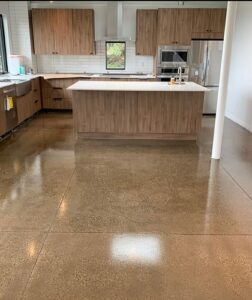Winterize Your Concrete
Winter is coming. And if you live in Utah, then you know that this is no idle statement. Sometimes our winters are mild and warm, but more often they are cold and icy and above all, long. It can rain, hail, and snow for days on end. The precipitation can freeze, melt and freeze again. You shovel and snowblow, but the concrete bears it all. Remember, Utah is known for having the “greatest snow on earth.” Your concrete may not think that Utah’s snow is so great, however. Your concrete could be taking a beating through April. What will that mean for your concrete?
Concrete is slightly porous, meaning there are bubbles, holes and tiny gaps. Most concrete projects are poured in smaller slabs that join together at seams. Precipitation in the form of rain, snow or even hail is likely to enter any possible gaps. When water freezes, it expands beyond its liquid volume. If water seeps into cracks or gaps during storms and then freezes, it can crack your concrete! Over time, the concrete will crack, separate and crumble. Come springtime, your concrete can look like it has aged forty years. You’ve paid good money to get that concrete – and you expect it to last a lifetime. Crumbling, breaking concrete is a bona fide nightmare. Is there anything you can do?
Fortunately, there are steps you can take to protect your concrete in the cold months of winter. You probably take the time to winterize your boats, plants, yards and house – why not your concrete?
The first concern would be existing damage. If your concrete has holes, cracking, or crumbling, then you are opening yourself up to further water damage – literally. All of the water and snow will seep into those openings and freeze, compounding and increasing the damage. If you have damaged concrete, you need to get it repaired. It isn’t too complicated or expensive; make sure to hire an expert or do plenty of research. Filling the gaps and smoothing over the crumbling concrete can prevent future damage. Still, if you have more serious problems, then you may even need to consider re-laying new concrete more professionally. If the cement repairs are minor (i.e., not requiring extensive new concrete), a quality, durable concrete epoxy coating is an effective way to prevent future damage.
If you already have good cement that is in decent shape, then winterizing your concrete will be quick and easy. Clean off your concrete and inspect it closely – which areas seem to get the most wear or need the most protection? Then consult with your concrete professionals about epoxy coatings. Epoxy coatings are an easy way to seal out any environmental and physical damage that your concrete may incur.
Epoxy Coating
are carefully created and applied to coat the surface of your concrete, providing resistance to moisture and friction damage. Epoxy coatings are very simple, but can be highly dangerous if your workspace isn’t properly ventilated or if you mix the chemicals without care. A quality concrete epoxy coating protects cement by waterproofing the surface. This keeps water, snow, ice, and other damaging liquids from wreaking havoc on your concrete. Be sure that you know what you are doing, or call the pros at Hard Rock Concrete. They can apply your epoxy coatings properly for long-lasting protection of all the concrete surfaces on your property. They can even apply concrete acid stains and other beautiful effects too make your boring concrete dazzling!
Winter is coming. But your concrete will be able to withstand anything the season throws at it!



